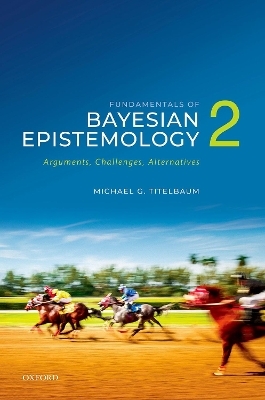
Fundamentals of Bayesian Epistemology 2
Oxford University Press (Verlag)
978-0-19-286315-7 (ISBN)
Bayesian ideas have recently been applied across such diverse fields as philosophy, statistics, economics, psychology, artificial intelligence, and legal theory. Fundamentals of Bayesian Epistemology examines epistemologists' use of Bayesian probability mathematics to represent degrees of belief. Michael G. Titelbaum provides an accessible introduction to the key concepts and principles of the Bayesian formalism, enabling the reader both to follow epistemological debates and to see broader implications
Volume 1 begins by motivating the use of degrees of belief in epistemology. It then introduces, explains, and applies the five core Bayesian normative rules: Kolmogorov's three probability axioms, the Ratio Formula for conditional degrees of belief, and Conditionalization for updating attitudes over time. Finally, it discusses further normative rules (such as the Principal Principle, or indifference principles) that have been proposed to supplement or replace the core five.
Volume 2 gives arguments for the five core rules introduced in Volume 1, then considers challenges to Bayesian epistemology. It begins by detailing Bayesianism's successful applications to confirmation and decision theory. Then it describes three types of arguments for Bayesian rules, based on representation theorems, Dutch Books, and accuracy measures. Finally, it takes on objections to the Bayesian approach and alternative formalisms, including the statistical approaches of frequentism and likelihoodism.
Michael G. Titelbaum is a Vilas Distinguished Achievement Professor in the Department of Philosophy at the University of Wisconsin-Madison. After majoring in philosophy at Harvard, he had a brief career as a high school teacher. He then earned a PhD in philosophy from the University of California, Berkeley, and completed a Visiting Research Fellowship at the Australian National University. He began at UW-Madison in 2009, and was Chair of the Department of Philosophy 2019-2022.
III Applications
6: Confirmation
7: Decision Theory
IV Arguments for Bayesianism
8: Representation Theorems
9: Dutch Book Arguments
10: Accuracy Arguments
Challenges and Objections
11: Memory Loss and Self-Location
12: Old Evidence, Logical Omniscience
13: Alternatives to Bayesianism
14: Comparisons, Ranges, Dempster-Shafer
| Erscheinungsdatum | 29.07.2022 |
|---|---|
| Verlagsort | Oxford |
| Sprache | englisch |
| Maße | 156 x 235 mm |
| Gewicht | 628 g |
| Themenwelt | Geisteswissenschaften ► Philosophie ► Erkenntnistheorie / Wissenschaftstheorie |
| Mathematik / Informatik ► Mathematik | |
| Naturwissenschaften | |
| ISBN-10 | 0-19-286315-0 / 0192863150 |
| ISBN-13 | 978-0-19-286315-7 / 9780192863157 |
| Zustand | Neuware |
| Haben Sie eine Frage zum Produkt? |
aus dem Bereich


![Was heißt Denken?. Vorlesung Wintersemester 1951/52. [Was bedeutet das alles?] - Martin Heidegger](/media/113619842)